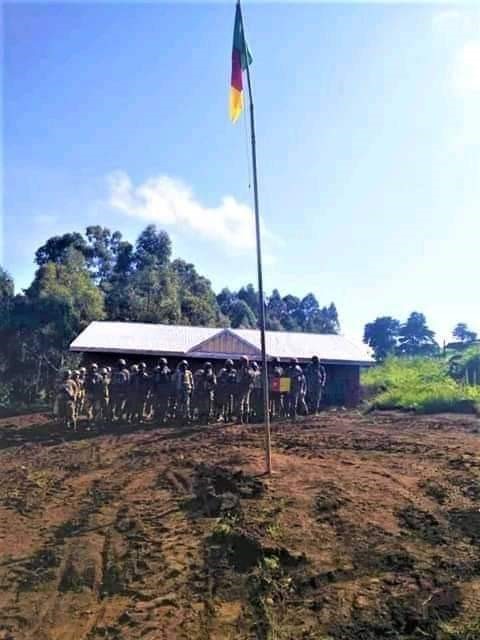- Locals Forced To Share Untreated Streams With Cows, Goats, Other Animals
- Community Technician Detained For Daring To Reconnect, Share Water To Both Village, Military Camps
- MINDEF Spokesperson Says Village Safety Is More Important Than Water
The people of Ngarbuh are still living with February 14, 2020’s painful memories of the brutal killing of over 20 of theirs, including 13 children. The people too are still waiting for justice to be served as the trial of those behind the executions is painstakingly slow. Now, salt has been added to a fresh wound as the military outposts created in the village after the unfortunate incident, have cut the villagers out of their own water scheme diverting the water to their camps. The villagers now have to share streams with cows and other animals, and are exposed to water borne diseases and other risks that come with unclean water.
“It took us a lot of time to realise the water project. The cost was over FCFA 30,000,000 and we almost gave up, if not for the Bishop of Kumbo Diocese who was bent on making sure that the villagers have potable water. For a small community like Ngarbuh, you can imagine how hard it can be to raise such an amount of money. The elites too were relentless, and finally we had the water. So you can imagine the frustration when our people cannot drink water; something they financed. It is worrying”, a Ngarbuh native told The Post. We have shielded their identities for fear of exposing them to unscrupulous power wielders who see a threat in any complaining voice.
Our source said as a welcoming community, they won’t say soldiers should not drink their water, but that they won’t also appreciate it, if instead of sharing the water with the community, the soldiers divert it to serve only them, to the detriment of the locals who painstakingly realised the FCFA 30,000,000 project through community financing and no government support.
In Ngarbuh like other areas in the Northwest region where clean water is a challenge, villagers using mostly community funded and run water schemes always ration their water to make it reach every home. This has largely been done in a communal way and spirit to ensure that everyone enjoys a right to safe drinking water and sanitation. As such, the community water, often catered for by a technician trained and appointed by village communities is responsible for maintaining, rationing and ensuring that water reaches every home and office where it is needed.
Ngarbuh locals said they were surprised when their water stopped flowing and in a bit to find out what was happening, the community water technician, Chin Edward inspected the water line and discovered that the military had put a stop cork that blocked water from circulating to villagers. The technician removed the stop cork, and rather rearranged it, by putting in place a dual stop cork that gives water to the Gendarmerie Brigade, as well as the rest of the village.
Sources in the village said after doing that, the technician was called up and when he responded to the call, he was arbitrarily detained in the Gendarmerie cell for four days. He was ordered to remove the dual stop cork and reinstate the lone one placed there by the military, which only redirects all community water to the military camp for soldiers’ use only.
Another source in the village says because of the treatment given to the technician, people have become scared to even ask why their taps don’t flow for days. The Post learnt that after diverting water to their camp, the military can keep it that way for four to five days nonstop and when they feel like it, they again redirect it to the village for a few hours then shut it down again. As such, villagers have rather given up and as such, rely on the streams they had long abandoned.
Access to safe drinking water and sanitation are internationally recognised human rights, derived from the right to an adequate standard of living under Article 11(1) of the International Covenant on Economic, Social and Cultural Rights.
Article 9 of The Universal Declaration of Human Rights orders that “No one shall be subjected to arbitrary arrest, detention or exile”, this right was taken away from the technician who was arbitrarily arrested and his freedom curtailed for four days, for simply doing his work.
By cutting the villagers off their source of water, the military is also depriving of their right to health. Article 25 (1) of The Universal Declaration of Human Rights bestows on everyone, the right to health. “Everyone has the right to a standard of living adequate for the health and well-being of himself and of his family, including food, clothing, housing and medical care and necessary social services…”
To get the side of the story from the administration, The Post contacted the Mayor of Ndu, Abdu Kafon Borno who feigned ignorance on the issue. He said no one has brought the issue before his office, and as such, he knows nothing about it.
The Post proceeded to the Ministry of Defence, and the Spokesperson for the Ministry, Navy Captain, Cyrille Serge Atonfack Guemo said the issue was not important, and that focus should rather be on the protection given the village, than the potable water the villagers are complaining is been curtailed from them. “Your request is unimportant”, he said. He went on to say there are better thing do, “and the safety of the villagers is the most important thing. In my opinion, you should focus on it and report on the efforts of the defence and security forces to restore peace”, Atonfack said.
